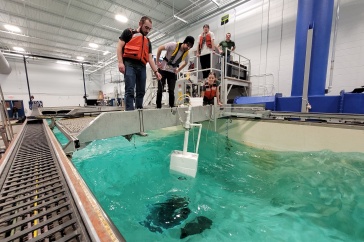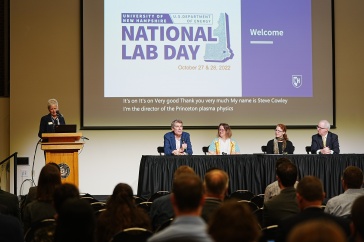
Former UNH provost John Aber is a world-renowned expert in natural resources and the environment who today concentrates most of his research in the area of sustainable ecosystem management. He co-authored “The Sustainable Learning Community” with Tom Kelly and pioneered the aerobic composting technique in use at UNH’s first-in-the-nation Organic Dairy Research Farm, which generates heat energy for use on the farm.
UNH’s commitment to LEED-certified construction and renovation is led by Doug Bencks, university architect and director of campus planning. In nearly three decades at UNH, Bencks has spearheaded projects that marry original campus architecture with the design and construction of modern buildings.
Elizabeth Burakowski ’07G, ’13G works in climate change and citizen science. A research assistant professor in UNH’s Institute for the Study of Earth, Oceans, and Space, Burakowski uses climate models, observations and remote sensing to understand how changes in landcover influence surface temperature and fluxes of energy and water landscapes interact with surface climate.
Joanne Burke is the Thomas W. Haas Professor in Sustainable Food Systems, providing leadership for the university’s efforts to advance sustainable agriculture, food choices, nutrition, and economic and social well-being on campus and beyond. She’s also a clinical professor in nutrition in the College of Life Sciences and Agriculture and director of the UNH dietetic internship program.
As associate vice president of energy and campus development, former UNHer Paul Chamberlin spearheaded the university’s EcoLine project and efforts to bring the cogeneration plant online, which today provides 85 percent of the Durham campus’ energy needs.
History professor Kurk Dorsey has written two books on environmental diplomacy issues and edited a third. He’s the author of “Whales and Nations: Environmental Diplomacy on the High Seas” and “The Dawn of Conservation Diplomacy: U.S.-Canadian Wildlife Protection Treaties in the Progressive Era.” He edited “City, Country, Empire: Landscapes in Environmental History” with fellow UNH historian Jeffry Diefendorf.
Starting with his virtual inauguration in 2008, UNH President Mark Huddleston has led by example in ensuring that sustainability remains a leading priority for UNH. Huddleston also elevated the profile of the university’s efforts early in his tenure by moving the Sustainability Institute into the provost’s office and appointing Tom Kelly as UNH’s first chief sustainability officer.
Through his work in social justice theatre, theatre and dance professor David Kaye has helped expand many students’ — and others’ — understanding of sustainability beyond the sciences. “A sustainable future requires us to ask a fundamental question: What do we really need to live a good life?” he explains.
Tom Kelly founded UNH’s Sustainability Institute, then called the Office of Sustainability, in 1997. Today he’s the institute’s executive director and the university’s chief sustainability officer. He co-edited and authored the 2009 book “The Sustainable Learning Community: One University’s Journey to the Future” and is a founding convener of Food Solutions New England, a six-state network working to realize a shared vision for a sustainable regional food system.
In his four decades as a professor of natural resources, William Mautz educated a full generation of UNH students about conservation practices and environmental issues. He worked closely with the UNH Foundation to help define and cultivate Oliver Hubbard’s sustainability-focused gifts and was involved in establishing the Sustainability Institute.
A UNH Law professor and director of the school’s accreditation and academic integration program, Margaret McCabe is also a food and society faculty fellow with the Sustainability Institute. McCabe provides leadership to engage the UNH community in efforts to advance sustainable agriculture, food choices, nutrition and economic and social wellbeing.
Miriam Nelson came to UNH from Tufts University in 2016 to become deputy chief sustainability officer and director of the Sustainability Institute. A leading researcher and author on nutrition and physical activity, Nelson helped shine a national spotlight on the connection between diet and sustainability by heading up the 2010 and 2015 national dietary guidelines advisory committees.
Jaime Nolan, UNH vice president for community, equity and diversity, spearheads a critical aspect of sustainability at UNH: creating a more diverse and inclusive community and promoting an atmosphere that is complex and intellectually and socially enriching for students, faculty and staff.
Campus Planning’s Steve Pesci plays a key role in UNH’s overall sustainability efforts by overseeing transportation planning and special projects, including Campus Connector, the Durham campus’ compressed-natural-gas-run shuttle system, and Wildcat Transit, UNH’s off-campus shuttle and the largest public transit system in New Hampshire.
Stephen Trzaskoma is a professor of classics and director of The Responsible Governance and Sustainable Citizenship project through UNH’s College of Liberal Arts, which runs a successful youth citizenship camp and funds sustainable citizen initiatives across the UNH campus.
Cameron Wake ’93G is the Josephine A. Lamprey Professor in Climate and Sustainability at the Sustainability Institute and director of Climate Solutions New England as well as the current faculty director of UNH’s sustainability dual major and a research associate professor in glaciology/environmental chemistry. Wake leads research programs to assess the impact of climate change in New England and to reconstruct climate change from ice cores recovered from glaciers on the Tibetan Plateau and in the Arctic.
Alumni
Roberta Barbieri ’88 parlayed her majors in international affairs and environmental conservation into her current role setting and driving the global environmental sustainability strategy for Diageo PLC, the world’s largest premium alcoholic beverage company.
For nearly a decade, Elisabeth Blaisdell ’99 was in charge of environmental stewardship for footwear company Timberland. Today she’s the vice president of products for Sustainable Apparel Coalition, considered the foremost global alliance for sustainable production for the apparel, footwear and home textile industry.
Paul Bradley ’86 is the founder and president of ROC USA, a nonprofit social venture dedicated to making resident home ownership viable nationwide through the development of affordable manufactured home communities. Prior to founding ROC in 2008, Bradley was vice president for manufactured housing for the New Hampshire Community Loan Fund.
Dan Clapp ’00 is general manager and partner of ReVision Energy, a full-service renewable energy contracting company and northern New England’s leading solar design, installation and service provider.
It was the end of his freshman year when Alex Freid ’13 first noticed the campus dumpsters loaded with discarded furniture and dorm items left by students heading home for the summer. Struck by the waste, he cofounded Trash 2 Treasure to resell useable goods and keep them out of local landfills. Today, he’s the executive director of the Post-Landfill Action Network, a national nonprofit that helps other campuses implement similar salvage programs.
As a student at UNH Manchester, Amelia Keane ’16 created the sustainability club Our World, established the campus’ recycling program, and interned at NextGen Climate. She’s currently serving as state representative for Nashua Ward 4, where sustainability is at the heart of her platform.
Philanthropic adviser Peter Lamb ’76 worked for the New Hampshire Charitable Foundation, served on the Association of U.S. Delegates to the Gulf of Maine Council on the Marine Environment and helped guide UNH’s Oliver Hubbard ’21 toward the visionary gift that established the Sustainability Institute.
Wendy Lull ’79G spent 25 years at the helm of New Hampshire’s Seacoast Science Center, a nationally known all-ages marine science education facility in Rye. President from the center’s opening in 1992 to earlier this year, Lull is credited with bringing science education to some 25,000 school children each year and hailed as a “passionate and inspiring voice for environmental conservation and ocean education.”
In 2011, Ryan MacPherson ’96 was named the first chief sustainability officer for the University at Buffalo in Buffalo, New York.
Allison Magill ’87 is the chair of Slow Food Seacoast, the local chapter of Slow Food USA and the international slow food movement, which works toward a healthier food system and slowing down the pace of life by focusing on the pleasures of good, clean, fairly sourced food.
Dietician Stacey Purslow ’11 is the program coordinator for the NH Farm to School program, which engages farmers, distributors, food service directors, teachers, health educators and administrators to bring farm-fresh foods to school lunch programs around the state.
Julie Rosenbach ’97 is South Portland, Maine’s first sustainability coordinator, a post she’s held since 2015. A one-woman sustainability shop, she’s in charge of overseeing the implementation of the city’s climate action plan and leading efforts as diverse as a solar panel study at the South Portland landfill and educating residents about the city’s recently implemented landscape pesticide ban.
Amy Seif Hattan ’93 is the vice president of sustainability for the global engineering firm Thornton Tomasetti in Portland, Maine.
Keegan Smith ’17, newly graduated from the College of Life Sciences and Agriculture, is the field sustainability coordinator for Coca-Cola of Northern New England.
Andrea Tomlinson ’91, Sarah Van Horn ’12 and Josh Weirsma ’04 all have ties to New Hampshire Community Seafood, a harvest co-op that enables local fishermen to work together to better protect marine resources and to fish more selectively. Van Horn and Weirsma founded the collaborative in 2010, and Tomlinson serves as general manager.
Donors
Ned Dane ’88, senior vice president at OppenheimerFunds and head of the firm’s private client group, was the first investor in the UNH endowment’s ESG sleeve — a sustainability-sensitive investment portfolio comprising funds with certain environmental, social and governance characteristics. Dane also sits on the UNH Foundation investment and finance committee’s committee on investor responsibility.
Durham philanthropist Tom Haas has supported UNH for more than a decade with generous gifts to SeagrassNet, an initiative to monitor the status of sea grass worldwide, and programs at the UNH Museum of Art, the Carsey School of Public Policy and UNH Manchester. In 2013, he established the Thomas W. Haas Professorship in Sustainable Food Systems to support the university’s work with Food Solutions New England on achieving a healthy, prosperous, just and sustainable food network.
The eldest of three brothers collectively known as UNH’s greatest benefactors, chicken-farmer-turned-businessman Oliver Hubbard ’21 gave more than $10 million over his lifetime to establish the Sustainability Institute, the first program of its kind to teach sustainable living. Credited alongside brothers Austin ’25 and Leslie ’27 with developing superior poultry breeding stock in the years following the Great Depression, Oliver Hubbard lived a life based on sustainable principles decades before the term was even coined.
Josephine Lamprey helped her family business, Lamprey Brothers Energy, become New England’s first Energy Star retail partner, educating customers about efficient heating and cooling systems to help reduce fossil fuel consumption, lower energy bills and soften the industry’s impact on the environment. She’s supported a number of UNH initiatives focused on climate change and innovation and funded the Sustainability Institute’s first endowed professorship, the Josephine A. Lamprey Professorship in Climate and Sustainability.
Phil Meldrum ’79 is the president of FOODMatch, Inc., the largest importer of olives from Greece in the U.S., which works with international farmers to grow and distribute responsibly sourced, all-natural and authentic Mediterranean products. Reflecting his and his company’s deep interest in sustainability, Meldrum has been a significant donor to the Sustainability Institute.
Read more about the overarching story of sustainability at UNH here:
-
Blue and White and Green All Over
-
Farm to Future
-
New Angles on Old Problems
-
A Carbon-Neutral Future
-
Starting Somewhere
Originally published in UNH Magazine Fall 2017 Issue
-
Written By:
Kristin Waterfield Duisberg | Communications and Public Affairs


















































